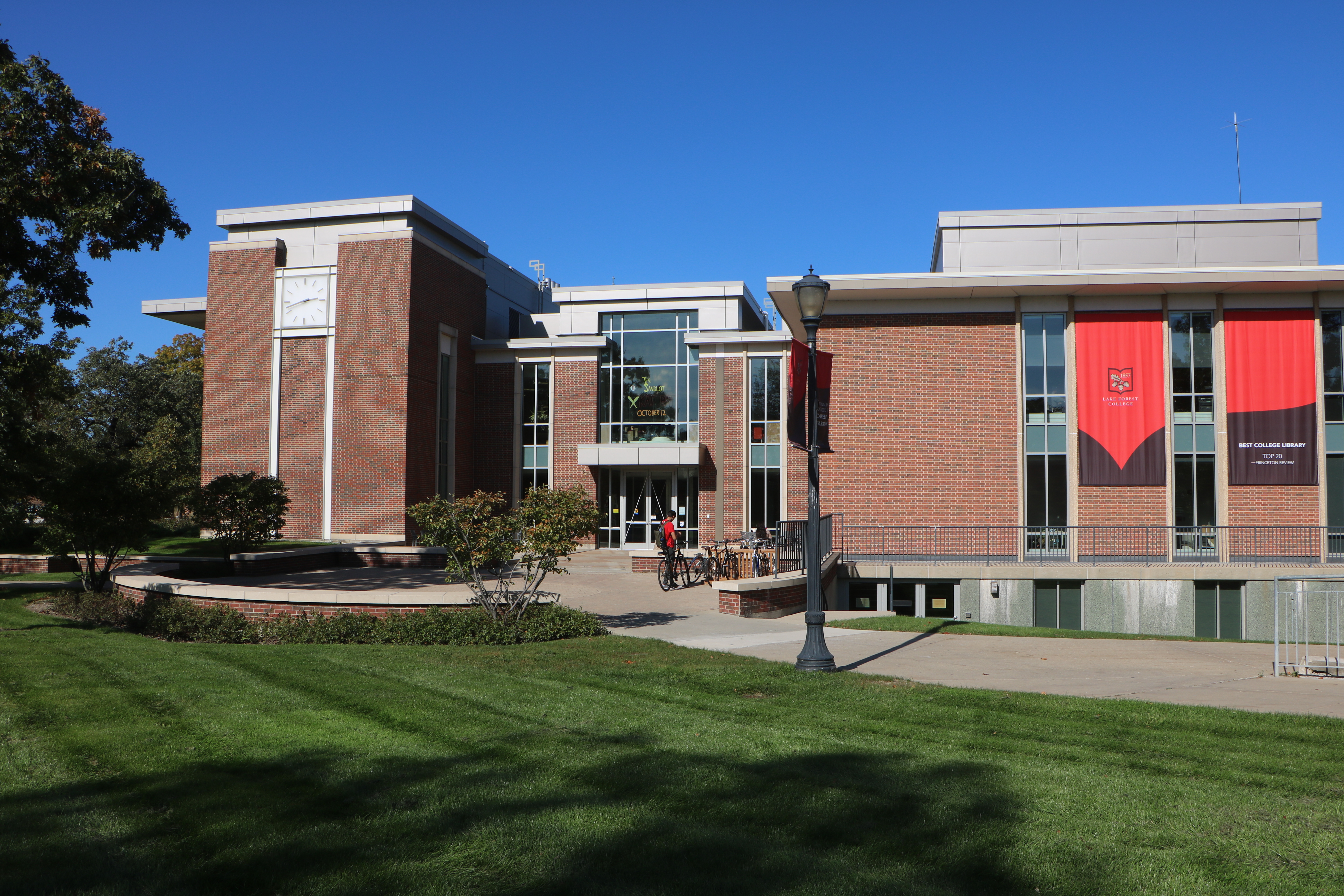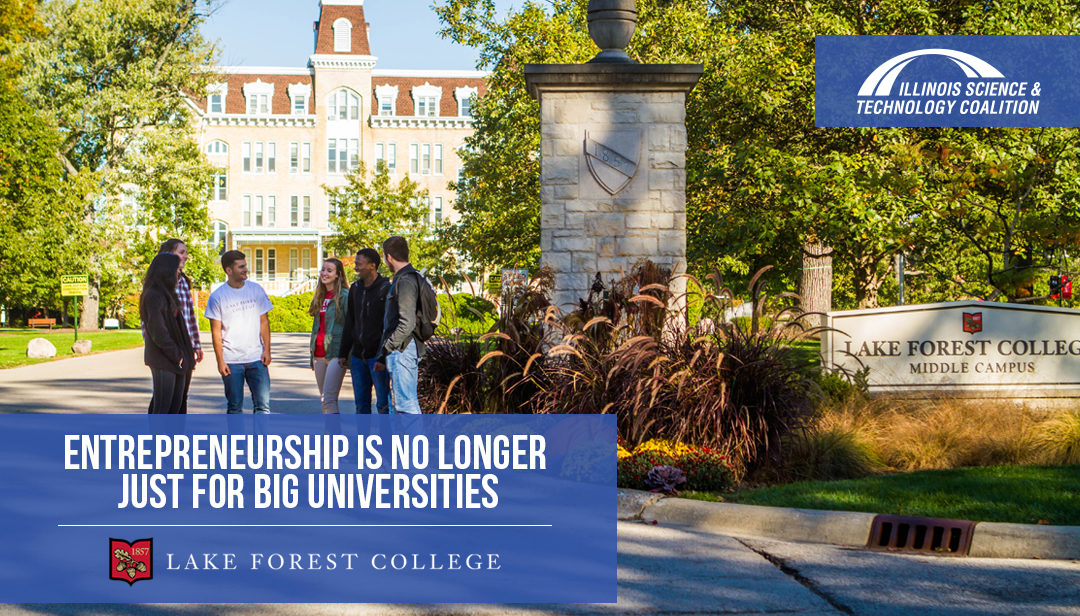Curriculum at Lake Forest College Opens
New Doors for Students
Entrepreneurship among students at Illinois’ universities has grown significantly in recent years. ISTC’s 2019 Entrepreneurship Index found that over the past five academic years, students and faculty at Illinois’ universities founded 978 startups, an increase of more than 150 percent over the previous five years. As entrepreneurship becomes more popular, universities of all sizes are adapting their curriculum to meet future workplace needs. In this edition of Catalyst, Linda Blaser of north-suburban Lake Forest College illustrates how incorporating entrepreneurship training with traditional coursework can lead to innovative education approaches and unlock new possibilities for students.
Subscribe to get the Catalyst newsletter sent to your inbox.
Having the dream when first entering college to someday become a medical doctor isn’t, in itself, unusual. But having the insight to also get a grounding in entrepreneurship to be better equipped to own a successful medical practice someday is quite unusual.
Meet Trysten Reeder, a junior at Lake Forest College who is majoring in biology and minoring in entrepreneurship and innovation—a relatively new, but very popular, minor at the liberal arts school located 30 miles north of Chicago.
While it was Reeder’s family who, hoping to spare him the struggles they faced as new physicians, suggested he get some business training as an undergrad, it was Reeder’s biology professor and academic advisor at Lake Forest who gave him the necessary push to take a look at the entrepreneurship and innovation program.
“She recommended I step outside my comfort zone and explore other classes not in the science department,” he said. “She told me, ‘You never know what you’re going to like.’”
Following that advice, the Phoenix, Arizona native took his first class with Patricia “Trish” Thomas, the director of the Entrepreneurship and Innovation Program (ENTP), during the fall semester of his sophomore year and “loved it” so much that by the next semester he declared an ENTP minor. The already busy student-athlete had no trouble fitting the business department classes into his science-heavy schedule.

Donnelley and Lee Library
The flexibility of the program makes the entrepreneurship and innovation (ENTP) minor the most popular minor at Lake Forest College. Currently, students from a multitude of business and non-business majors are pursuing the ENTP minor.
“We include tracts for social innovation, self-employment and small business, intellectual property, intrapreneurship—a system that allows an individual to act like an entrepreneur within a company or other organization—and high-potential startups,” Thomas said. “Our program is anchored in teaching students the skills required to cultivate entrepreneurial resilience, which is a growth mindset that involves reframing failure, fearless asking, navigating tough conversations, managing through adversity, and building networks for support.”
To meet the expanding desire of students from multiple majors to pursue an entrepreneurship minor, the College is creating a new home for the program. The Oppenheimer Center for Entrepreneurship and Innovation, to be constructed within the upper level of the award-winning Donnelley and Lee Library, will be centrally located on campus. “With approximately 20 percent of current students choosing to minor in entrepreneurship, this impressive new facility will give this important academic program a prominent home on our campus,” said Philip Hood, vice president for external relations and secretary of the College.
This move is part of the College’s strategic approach to meeting future higher education and workplace needs, which have changed substantially from 10 to 20 years ago. This year a team of senior administrators and faculty are immersed in exploring curriculum innovation to meet those changing needs.
An early outcome of that approach is the College’s newest major, data science, which launched this fall. An interdisciplinary program, the data science major responds to an ever-intensifying societal demand for expertise in the management and analysis of data. The program provides education and training focused on the collection, management, analysis, and interpretation of data. Students pursuing a major in data science can choose from three tracks: finance and economics; statistics; and computer science.

Preliminary plans for the future Oppenheimer Center for Entrepreneurship and Innovation
Data science also is available as a minor for students with no prior exposure to statistics or computer science. The minor can be completed within the first two years of study. In this way, students majoring in the humanities, social sciences, or natural sciences can acquire data analytic expertise—particularly in the areas of statistics, statistical programming, and machine learning—that can be used in upper-level coursework. Data management, visualization, and analysis techniques, coupled with computer programming fundamentals, provide students with a skill set that is increasingly in demand by employers.
Lake Forest’s Career Advancement Center (CAC) is regarded as a national model. Recently, the College was ranked #9 for best schools with internships and #12 for best alumni network by Princeton Review. To connect with Lake Forest College students for internships or career placement, email [email protected].
Lake Forest College is a national liberal arts college located in Lake Forest, Illinois. It has a student body of 1,570 students from 43 states and 85 countries.
Subscribe
Subscribe to get the Catalyst newsletter sent to your inbox.
What we’re reading
- Network Business Systems and Microsoft announce agreement to deliver broadband internet to rural communities in Illinois, Iowa, and South Dakota [Microsoft]
- A New Chicago Startup Is Working to Bring Congestion Pricing to Chicago [Chicago Inno]
- Fermilab and University of Chicago scientist Josh Frieman awarded $1 million by DOE [Fermilab]
- Illinois better at attracting job talent than growing it [Crain’s Chicago Business]
- A Plan to Revitalize the Illinois Economy and Build the Workforce of Tomorrow [Illinois Department of Commerce and Economic Opportunity]

